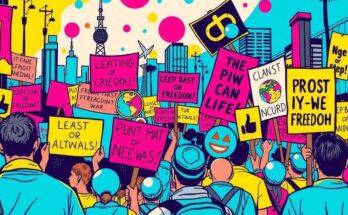Nigeria’s democracy is increasingly undermined under President Bola Ahmed Tinubu, as his government strays from accountability, respect for laws, and fairness. INEC’s failures hinder voter participation, while nepotism colors his appointments. Additionally, Tinubu’s consolidation of power and anti-opposition tactics raise concerns about the future of democracy in Nigeria as the 2027 elections approach.
Democracy is fundamentally about ensuring equal opportunities for all. It requires accountability, respect for the rule of law, and a free press. However, in the last two years, Nigeria under President Bola Ahmed Tinubu has shown an alarming departure from these principles. This has resulted in significant failures across the board—economically, socially, and in governance overall.
One major disappointment has been the role of the Independent National Electoral Commission (INEC). Tasked with overseeing voter registration and ensuring fair elections, INEC has consistently fallen short, providing Permanent Voter Cards (PVC) to a mere 30 percent of applicants in recent cycles. This systemic failure blocks millions from exercising their fundamental democratic right to vote.
Additionally, Tinubu’s administration has been marred by nepotism, blatantly disregarding the Federal Character principle that was designed to ensure equitable appointments across Nigeria’s diverse ethnic groups. Instead, appointments favor Tinubu’s Yoruba ethnic group and those close to him. This pattern extends to law enforcement, military positions, and other key governmental roles, raising serious concerns about fairness and merit in governance.
A glaring example is the Lagos-to-Calabar Coastal Road project, awarded without the usual parliamentary oversight or a bidding process. The contract went to Mr. Chagoury, a personal friend of Tinubu’s, showcasing a troubling blend of personal interest and public responsibility that suggests an eroding respect for governance norms.
In terms of separation of powers, Tinubu’s government has systematically blurred the lines between the executive, legislative, and judicial branches. He seems to operate with little regard for checks and balances, concentrating authority primarily within the presidency. This threatens the very foundations of democratic governance, as Tinubu appears to speak for all branches of government, undermining their independence.
Furthermore, Tinubu’s quest for absolute political dominance has led him to wage a war on opposition parties, primarily targeting the People’s Democratic Party (PDP). Reports indicate the infiltration and destabilization of opposing political entities, even harming smaller parties like the Labour Party. These actions resemble those of authoritarian regimes, silencing dissenting voices and curtailing freedoms.
Recent events underscore this shift towards autocracy. In May 2025, without any formal vote or discussion, Tinubu declared himself the sole candidate for the APC in the upcoming 2027 elections—a move many have called a blatant disregard for democratic procedures. This reinforces the idea that he aims to eliminate competitors, positioning APC as Nigeria’s sole party and himself as its only viable candidate.
As Nigeria gears up for the 2027 elections, Tinubu’s tactical dismantling of opposition serves a clear purpose: to centralize political power within his party and himself. Citizens who value democracy must remain vigilant and work to preserve their right to choose freely. It is essential that all Nigerians recognize the importance of resisting these authoritarian tendencies to protect the very democracy that is at stake.
•Pearse, PhD., is a public affairs analyst; convener of Reset Lagos PDP, and a member of the Board of Governors at the Peoples Democratic Institute, PDI.
In summary, Nigeria’s democracy is facing troubling challenges under President Tinubu’s leadership. His administration has strayed from foundational democratic principles, utilizing nepotism, circumventing normative governance procedures, and allowing for the erosion of checks and balances. As the 2027 elections approach, it is vital for citizens to actively defend their democratic rights against attempts to monopolize political power within the APC.
Original Source: tribuneonlineng.com




